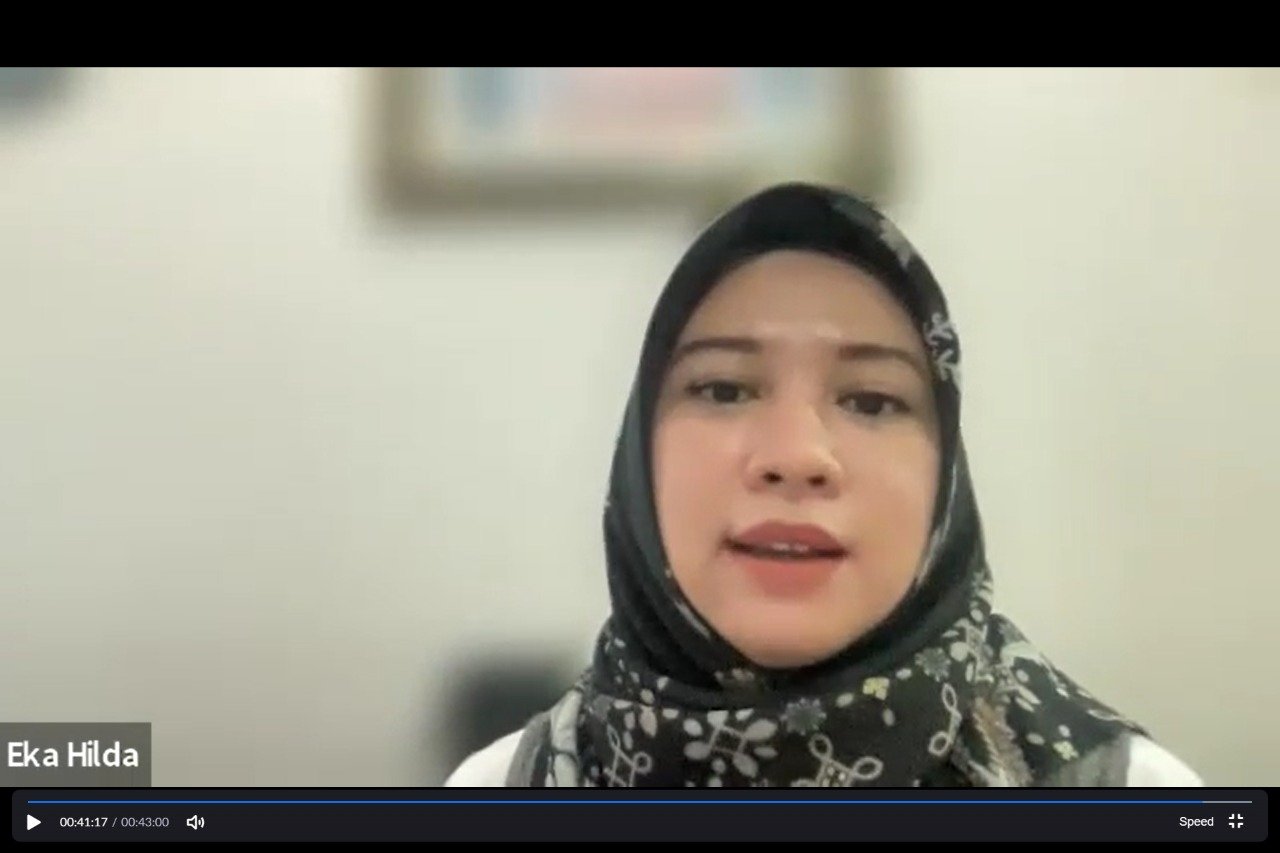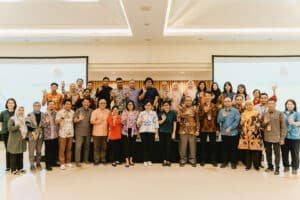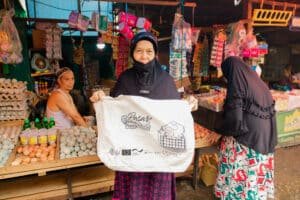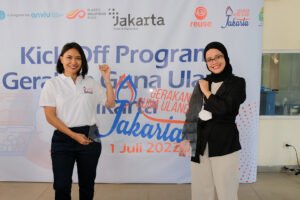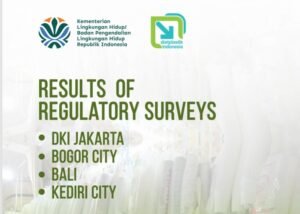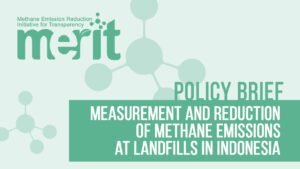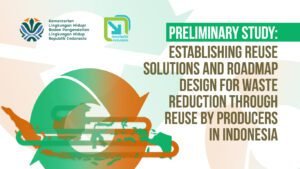Almost all countries are competing to deal with various environmental issues, one of which is single-use plastic waste pollution. In March 2022, countries that are members of the United Nations (UN) just passed a global agreement to address the issue of single-use plastics at the international level through the ‘Global Plastic Treaty.’ As the fourth most populous country with a high level of single-use plastic consumption, Indonesia is one of the countries committed to the treaty. The Directorate of Waste and Hazardous Waste Management (PSLB3) of the Ministry of Environment and Forestry (KLHK) is the Indonesia National Focal Point at the Intergovernmental Negotiating Committee (INC) Plastic Pollution for the Global Plastic Treaty.
Before the global commitment, KLHK has prepared strategies to address the issue of single-use plastic pollution through various regulations, one of which is the Minister of Environment and Forestry Regulation No. P75 of 2019 concerning Roadmap for Waste Reduction by Producers, which can be used as a basis for Regional Governments to develop regulations in each region by issuing Mayor Regulations (Perwali), Regent Regulations (Perbup) or Governor Regulations (Pergub) for restrictions on single-use plastics. To date, 2 Provinces and 98 Cities/Regencies have already implemented single-use waste restriction regulations. In addition to encouraging local governments to issue rules, KLHK also continues to monitor the progress of reducing single-use plastic waste in various regions in Indonesia, one of which is through the publication of data on waste generation that is updated regularly on the National Waste Management Information System or SIPSN page.
Although there have been preventive measures through government policies, the problem of high generation of single-use plastic waste still needs to be solved due to the high level of single-use plastic use (overconsumption). Not to mention the COVID-19 pandemic has made the trend of purchasing goods, food and beverages online (online delivery platform). Based on data from the Oceanographic Research Center of the Indonesian Institute of Sciences (P20 LIPI) entitled “The Impact of Large-Scale Social Restrictions (PSBB) and Work From Home (WFH) on plastic waste in Jabodetabek” provides the fact that online shopping in the form of packages increased by 62% and online shopping in the form of services / ready meals increased by 47%. Online shopping frequency also increased from 1-5 times/month to 1-10 times/month, and the packages/food were packaged using plastic. This ongoing problem certainly requires a solution that can be applied by the community and has a sustainable impact on the environment and health. The solution in question ultimately revives old habits or local wisdom through a reuse lifestyle. Promoting the reuse lifestyle has intensified through the Jakarta Reuse Movement initiated by the Indonesian Plastic Bag Diet Movement and Zero Waste Living Lab by Enviu. This movement involves various communities and business groups as a form of effort to reduce single-use plastic waste in DKI Jakarta. This solution aligns with the single-use plastic restriction intervention regulated by the Ministry of Environment and Forestry. Gerakan Indonesia Diet Kantong Plastik (GIDKP) had the opportunity to interview Eka Hilda, Junior Expert of Environmental Impact Control of the Ministry of Environment and Forestry (KLHK), to discuss the Indonesian Government’s plan to tackle single-use plastic pollution.
Using single-use plastic containers for food and beverages designed as attractive as possible by packaging manufacturers makes it more convenient for people to use single-use plastics. People aware of single-use plastic pollution also have no choice but to choose more environmentally friendly packaging (consumer right). In response, has the MoEF collaborated with certain parties to regulate or invite business actors (producers) to switch to using more environmentally friendly packaging, or can it be used repeatedly?
“Since the enactment of Permen LHK P75/2019, there have been many business opportunities with new ideas and digital ecosystems to support the ambition of reducing plastic waste. Start-ups dominate 155 businesses (until May 2022). These are bulk store businesses that upcycle, reuse, and use alternative packaging alternatives to overcome the use of single-use plastics. For environmentally friendly or reusable materials, KLHK always reminds business actors that the packaging must be safe for health and the environment. Remember to educate consumers on managing reusable products that can be reused later. For business actors who have begun to provide alternative environmentally friendly containers, there are incentives that KLHK can provide by socializing a road map with which producers or business actors have applied waste reduction initiatives. KLHK is conducting a study in collaboration with foreign cooperation projects on potential financial impact and economic instruments based on plastics. The hope is that the study can find out the possible incentives that can be given.
Is the Gerakan Guna Ulang Jakarta (GGUJ) program in line with and contributes to the Minister of Environment and Forestry Regulation No. P75 of 2019, to target the reduction of single-use plastic waste from the prevention side?
“Of course, it is very much in line because it is mentioned in Permen LHK No. P75 of 2019 that one of the ways to reduce single-use plastic waste is by implementing a reuse system with the hope that producers can apply it to the form of packaging or containers that are used repeatedly.”
Considering that the Reuse Movement has only been implemented in DKI Jakarta Province, does the Ministry of Environment and Forestry itself see that this program can be implemented in other regions and that the people are ready to implement this reuse lifestyle?
“We see that the reuse movement program in Jakarta can be implemented in other areas as a pilot program. However, because this program is still new, we need time to evaluate how the implementation of this program in the field, especially what things can support the reuse ecosystem, how the community responds to this program, the response of businesses, and how far this program affects the community and businesses.”
Is there any potential cooperation between KLHK and other parties to support the reuse movement?
“To support the reuse movement, currently KLHK, especially the Directorate of Waste Reduction, is building collaboration with various parties to encourage the reuse ecosystem such as the preparation of sanitation standards, dissemination of the reuse movement, and educational activities regarding reuse initiatives to the community by involving Non-Governmental Organizations (NGOs). In addition, we coordinate with the Food and Drug Monitoring Agency (BPOM), a strategic partner for reuse policy, regarding the preparation of studies or standards for products with reusable packaging, especially regarding packaging safety.”
What are the government’s efforts to support and succeed in this pioneering reuse program in Jakarta?
“KLHK collaborates with DLH DKI Jakarta Province in implementing Jakarta Governor Regulation 142/2019 on the Obligation to Use Environmentally Friendly Shopping Bags and Governor Regulation 102/2021 on the Obligation to Manage Waste in Areas and Companies, which is in line with the implementation of Permen LHK P75/2019. Currently, a pilot project is being carried out involving 100 food and beverage businesses, retailers, and hotels in DKI Jakarta with the output target of technical guidance documents for the implementation of the Pergub, especially for limiting single-use plastics by promoting reuse initiatives supported by the results of studies and reuse sanitation standards. KLHK is also working with foreign parties and businesses to develop a ‘Reuse and Refill Roadmap in Indonesia,’ which will also be involved with the reuse program in Jakarta. Hopefully, producers, communities, and local governments will be able to implement it and encourage this reuse ecosystem.”
—
This article was written as one of the outputs of the collaboration between the Indonesian Plastic Bag Diet Movement (GIDKP), Allas as one of the Zero Waste Living Lab ventures by Enviu, and The Deutsche Gesellschaft für Internationale Zusammenarbeit GmbH (GIZ) who have a shared ambition to reduce single-use plastic waste and build a reuse ecosystem in the food and beverage sector, starting from DKI Jakarta Province. This collaboration is part of the Pilot Project under the Collaborative Actions for Single Use Plastic Prevention in Southeast Asia (CAP SEA) Project implemented by GIZ. The German Federal Ministry for the Environment, Nature Conservation, Nuclear Safety and Consumer Protection (BMUV) funds the CAP SEA project. It is part of a global project to

